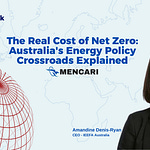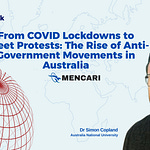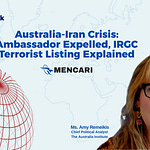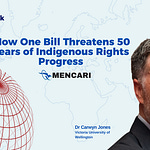Australia made a big decision in August 2025 to officially recognize Palestine as a country, joining other Western nations like the UK, France, and Canada. This podcast features Dr. Martin Kear from the University of Sydney, who explains why this happened now, what it means for Middle East peace, and how Australian politics is reacting.
The conversation covers complex topics like Hamas, Palestinian leadership problems, and whether a two-state solution can actually work.
Dr. Kear explains these complicated international issues in a way that helps listeners understand the bigger picture of this historic policy change.
Truth matters. Quality journalism costs.
Your subscription to Mencari directly funds the investigative reporting our democracy needs. For less than a coffee per week, you enable our journalists to uncover stories that powerful interests would rather keep hidden. No corporate influence. No compromises. Just honest journalism when we need it most.
Five Key Takeaways
Coordinated Western Response: Australia's recognition aligns with a coordinated movement by Western nations including the UK, France, and Canada, representing a significant shift away from US-controlled Middle East peace processes
Domestic Political Controversy: Opposition leader Susan Lee criticized the decision after Hamas praised Australia's move, creating a political divide over whether recognizing Palestine legitimizes terrorist organizations
Palestinian Leadership Crisis: Current Palestinian Authority President Mohammed Abbas faces an 80% disapproval rating, with Dr. Kear identifying imprisoned leader Marwan Barghouti as the only figure capable of uniting Palestinians democratically
Democratic Legitimacy Debate: Western demands to exclude Hamas from future Palestinian governance conflict with democratic principles, as Hamas won legitimate elections in 2006 and remains popular among Palestinians
Two-State Solution Skepticism: Dr. Kear expresses doubt about achieving a sovereign Palestinian state, citing Israel's permanent settlement strategy and unwillingness to withdraw from East Jerusalem
Detailed Synopsis
This episode of Part8A examines Australia's groundbreaking decision to recognize Palestinian statehood, announced by Prime Minister Anthony Albanese for presentation at the September 2025 UN General Assembly.
Host Miko Santos interviews Dr. Martin Kear, a specialist in Palestinian politics from the University of Sydney, to unpack the multifaceted implications of this policy shift.
The conversation begins with Dr. Kear explaining the momentum behind Australia's decision, attributing it to growing international frustration with the humanitarian crisis in Gaza and the dormant Middle East peace process controlled exclusively by Israel and the United States. He emphasizes how this coordinated recognition by Western nations, particularly those with Security Council membership like France and the UK, represents an attempt to bypass traditional diplomatic channels and apply meaningful pressure on Israel.
A significant portion of the discussion addresses domestic Australian political reactions, particularly opposition criticism following Hamas's endorsement of the recognition.
Dr. Kear contextualizes Hamas's response within their broader political objectives, explaining how their October 2023 attack aimed to disrupt the normalization of Israeli occupation rather than expressing mere hatred of Israel.
The interview delves deeply into Palestinian governance challenges, highlighting the legitimacy crisis facing the Palestinian Authority under President Abbas's authoritarian leadership. Dr. Kear advocates for inclusive democratic processes that allow Hamas participation, arguing that Western exclusion of democratically elected representatives undermines Palestinian self-determination and repeats colonial patterns of imposed governance.
The discussion concludes with skeptical assessments of long-term prospects for Palestinian sovereignty, examining how Israeli settlement strategies have systematically undermined the viability of a two-state solution, while considering Australia's potential role as a middle power in future diplomatic initiatives.
What Readers Will Learn
Geopolitical Strategy Analysis: Understanding how coordinated diplomatic recognition serves as an alternative to traditional peace process mechanisms and the strategic implications of bypassing US-controlled negotiations.
Democratic Governance Complexities: Insights into the tension between Western security concerns and democratic legitimacy in Palestinian politics, including the challenge of excluding popular movements from governance structures.
Middle East Policy Evolution: Comprehensive analysis of how Australia's recognition fits within broader Western policy shifts toward Palestine and the changing dynamics of international Middle East diplomacy.
Palestinian Political Landscape: Detailed examination of Palestinian Authority leadership challenges, the role of Hamas in Palestinian politics, and the search for legitimate representation that can unite Palestinian factions.
Two-State Solution Realities: Critical assessment of the practical obstacles to Palestinian sovereignty, including settlement expansion, Jerusalem's status, and the international community's limited leverage over Israeli policy.
This is not a sponsored video/audio. A small commission will be paid to us if you purchase anything through some of the affiliate links in our product listings.
If you want to chat more about this topic, I would love to continue this conversation with you, over Twitter @realmikosantos!
This podcast is powered by Kangaroofern, Australia's Independent Podcast Management Company.
Thanks so much for listening to our podcast!
If you enjoyed this episode, be sure to subscribe so you'll be notified when a new episode is posted in the Apple podcast, Google podcast, Spotify, Stitcher or via RSS.
If you think others could benefit from listening, please share it on your socials.
You can also subscribe to the podcast app on your mobile device.
If you found value in this episode, leave us an Apple Podcast review. Ratings and reviews from our listeners are extremely valuable to us and greatly appreciated. They help our podcast rank higher on Apple Podcasts and expose our show to more awesome listeners like you.
This is a premium episode. If you would like to discuss this with other subscribers or get access to the episodes, visit Readmencari.com
Got a News Tip?
Contact our editor via Proton Mail encrypted, X Direct Message, LinkedIn, or email. You can securely message him on Signal by using his username, Miko Santos.
While mainstream media serves corporate interests, you deserve the truth.
Your Mencari subscription—less than a coffee per week—powers real independent journalism. Our reporters dig into the stories powerful people desperately want buried. No corporate masters. No political handlers. Just the uncomfortable truths that matter most right now.
This is journalism without compromise, funded directly by readers who refuse to be misled. If this reporting opened your eyes, hit Restack so others can see what they're missing.
Not ready to be paid subscribe, but appreciate the newsletter ? Grab us a beer or snag the exclusive ad spot at the top of next week's newsletter.












